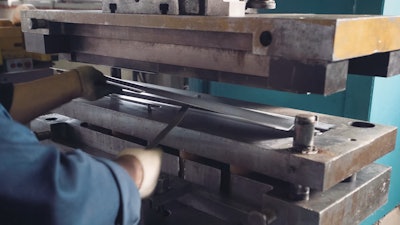
iStock.com/LYagovy
CLEVELAND — Metalforming manufacturers forecast an uptick in economic activity in the next three months, according to the June 2025 Precision Metalforming Association Business Conditions Report.
Prepared monthly, PMA’s report provides an economic indicator for the next three months of manufacturing, sampling 93 metalforming companies in the United States and Canada.
PMA’s June report shows that 24% of surveyed manufacturers anticipate an increase in general economic activity in the next three months (up from 16% in May), 48% predict no change in activity (compared to 46% in May) and 28% expect a decrease in activity (compared to 38% last month).
Metalformers also predict a slight improvement in incoming orders, with 24% of survey respondents anticipating an increase in orders in the next three months (compared to 22% in May), 47% expecting no change (compared to 44% last month) and 29% forecasting a decrease in orders (down from 34% reported in May).
Current average daily shipping levels remained steady in June, with 42% reporting no change in shipping orders (the same percentage reported in May), 29% reporting an increase in shipping levels (compared to 30% last month) and 29% reporting a decrease in levels (compared to 28% in May).
The survey also showed that 13% of respondents had workers on short time or layoff in June (up from 9% in May), while 35% are currently expanding their workforce (compared to 32% in May). Thirteen percent of respondents reported an increase in lead times in June, up from 12% in May.
“PMA’s latest Business Conditions Report shows the first uptick in member optimism in three months,” said PMA President David Klotz. “That’s welcome news, but manufacturers are still facing serious challenges — particularly ongoing trade uncertainty, including the recent doubling of steel and aluminum tariffs to 50 percent. U.S. metal-using manufacturers are already paying significantly more for steel than their global competitors. If that cost gap continues to widen, customers will increasingly turn to imported finished products — undermining our members’ competitiveness and putting American jobs at risk.”
“At the same time, our members are encouraged by the pro-manufacturing provisions in the reconciliation bill moving through Congress,” Klotz continued. “The predictability this legislation provides is critical to their ability to invest in R&D, upgrade equipment and hire more American workers.”
Full report results are available at pma.org.






















